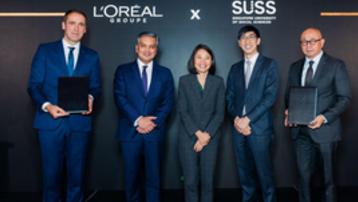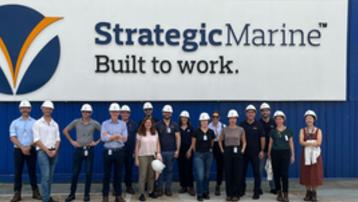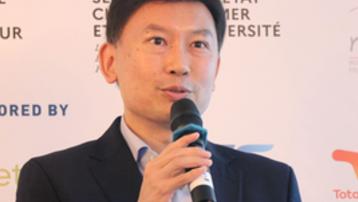Companies news
CNRS teams up with A*STAR, NTU and NUS to launch new S$56 million hybrid artificial intelligence programme

More than 2 organisations and 18 universities from both countries involved in the programme
A new S$56 million Hybrid Artificial Intelligence (HAI) programme has been launched through an international collaboration involving the French National Centre for Scientific Research (CNRS), the Agency for Science, Technology and Research (A*STAR), Nanyang Technological University. Singapore (NTU) and the National University of Singapore (NUS).
Known as the DesCartes Programme and led by Francisco Chinesta, it will develop solutions that support the creation of “Smart Cities”. This includes developing hybrid AI methods that aim to enhance real-time decision-making in urban-critical systems, with a focus on individuals and society at large. The five-year programme will also adopt a holistic and multidisciplinary approach that combines AI with existing subject-based models from physics and engineering.
Funded by the National Research Foundation, Singapore (NRF), with contributions from participating partners, the innovations developed from the collaboration will support Singapore’s Smart Nation objectives and its ongoing digital transformation efforts. Based in Singapore at the Campus for Research Excellence and Technological Enterprise (CREATE), the DesCartes Programme will be hosted by CNRS@CREATE and will tap on the research expertise of the CNRS, A*STAR, 18 universities from both Singapore1 and France2 and on the application expertise of 5 companies3.
Baillargeat Dominique, Director of CNRS@CREATE, said,
“The primary objective of the DesCartes Programme is decision-making in “critical urban systems”, which is one of the many key challenges related to the “smart city” concept that many societies are striving towards. The CNRS has made AI and its applications one of its priorities, especially nurturing international partnerships. This is one way to extend the research conducted at Interdisciplinary Institutes of Artificial Intelligence localised in France, and to expand one of its components to include Singapore.”
Professor Lam Khin Yong, NTU Senior Vice President (Research), said,
“NTU’s partnership in this bilateral research agreement provides our scientists with a valuable platform to engage their counterparts in renowned French research institutions and universities, while allowing the partnership to leverage NTU’s strengths in Engineering, AI and Social Sciences. This collaboration also signals NTU’s commitment to Singapore’s Smart Nation drive, which is in line with the NTU 2025 strategic plan that aims to accelerate the translation of research discoveries into innovation for the benefit of mankind.”
Professor Chen Tsuhan, NUS Deputy President (Research and Technology), said,
“NUS is very excited to be a partner of the DesCartes Programme. We look forward to contributing our research strengths that are aligned with the Research, Innovation and Enterprise 2025 Plan, such as AI, intelligent modelling, analytics and cybersecurity to advance trusted decision-making for crucial systems like electricity networks, smart buildings, and future transportation networks. By bringing together the best researchers from Singapore and France, I am confident that we can generate a comprehensive range of innovative solutions to enable smart cities of the future.”
Professor Alfred Huan, Assistant Chief Executive, Science and Engineering Research Council, A*STAR, said,
“A*STAR looks forward to bringing our multidisciplinary AI capabilities to this partnership, working together with the Singapore R&D ecosystem and researchers from France to achieve breakthroughs in urban solutions and smart city infrastructures. Collaboration is key to translating innovative R&D into positive outcomes for societies of the future.”
From optimising the electricity network to managing traffic for delivery drones
First unveiled at the second meeting of the France-Singapore Joint Committee on Science and Innovation (JCSI) held virtually on 24 June 2021, the DesCartes Programme will ride on the strong AI research collaborations between Singapore and France. It will focus on four areas – data and its applications ; verifiable and explicable AI; natural language processing; and human-machine/AI interaction. It will also explore key emerging areas that will support the creation of Smart Cities.
For example, the solutions developed could enhance urban mobility and energy management systems, or to anticipate the needs of future transportation networks, intelligent industries, and smart buildings. This includes creating urban systems that will be capable of analysing data on the population's use of services to further optimise and enhance them.
“For instance, we intend to develop solutions that optimise supply with demand in the electricity network or relieve traffic for drone taxis or delivery drones, in addition to developing smart predictive maintenance applied to industrial tools,” Baillargeat points out.
The DesCartes Programme will also recruit some 30 PhD students, 50 postdoctoral fellows, and over 80 other academics and researchers from both countries, to support the development of solutions and innovations. Some of the French academics will be based in Singapore for long-term stays that will be supported under the programme.
1 NTU, NUS, Singapore University of Technology and Design, Singapore University of Social Sciences, and Singapore Management University.
2 Université Paris-Saclay, École Normale Supérieure-Paris-Saclay, Université Toulouse III - Paul Sabatier, Université Lyon III - Jean Moulin, Université Côte d’Azur, Université de Bordeaux, École Nationale de l’Aviation Civile, Paris Sciences & Lettres, Université de Strasbourg, Arts et Métiers, Université Grenoble Alpes, INP Grenoble and INP ENSEEIHT.
3 ARIA, CETIM, EDF Lab Singapore, ESI Group and Thales & Thales Solution Asia.
Photo: Unsplash


